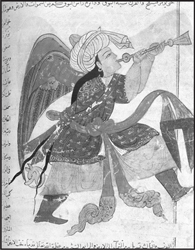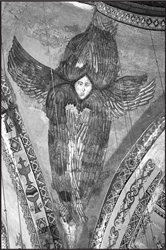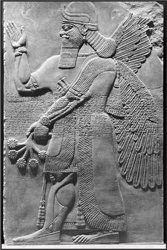The Angel of Eden (19 page)
Authors: D J Mcintosh
I'd once taken pride in the city, believing Turkey to be my original home. The history of my birthplace, its position at the intersection of Eastern and Western cultures, had become a legend in my mind,
probably because I grew up so far away. As a child I'd imagined romantic spires, exotic mosques, the smell of spice, the muezzin's song at sunset. The real Istanbul did not disappoint, but my dreams now seemed a farce. I no longer believed I'd been born there at all.
I'd booked us in at the Four Seasons Sultanahmet, a five-star neo-classical hotel close to the city's main historic venues. We were on Strauss's dime; why not bask in a little luxury? The decor gave it a distinctive Eastern flavorâwarm, mellow colors, dark wooden accents, metal grilles, and marble floors that shone like mirrors. Bennet couldn't hide the smile tugging at the corner of her lips as we entered the elegant lobby.
The next morning we headed straight for Topkapi Palace, an exotic fantasy of courtyards, fountains, and magnificent chambers numbering in the hundreds. The royal compound originally functioned as a small city, home to thousands of people. Through the Gate of Felicity we reached the Third Courtyard, its ancient hollow trees still sprouting green leafy canopies. The Harem Quarters entrance, almost hidden at one side of the gate, had itself once housed a multitude of wives, concubines, slaves, and guards, all living in a labyrinth of corridors and rooms. Struck by the beauty of the chambers, Bennet took wads of photos with her high-end Leica. “I couldn't bear to part with my camera,” she'd said before we left the hotel. “I'd rather go without food than relegate it to the pawnshop. And photos are going to be as important as the prose.” As we made our way through the rooms, she'd break off to make entries in her laptop while I consulted the fat guidebook I'd bought.
“âMuslim women could not be concubines; it was forbidden. Many in the harem were Christians from Armenia completely subject to the whims of the sultan and his mother, who behaved more like a queen than the sultan's first wife,'” I read out. “It says here
that once, in a pique of temper, a sultan ordered 280 concubines forced into sacks, taken out in boats, and drowned in the Bosphorus.”
Bennet tucked her laptop under her arm and shuddered. “The place is glorious. But imagine never being able to leave.”
I flipped the guidebook page and sucked in a breath. “The eunuchs had it even worse.”
“Glad we were born in this day and age, no?”
“Even if I'd lived back then I wouldn't have qualified. The Ottoman harem eunuchs were all black men, Abyssinian or Nubian. An Egyptian Coptic monastery supplied the new recruits. The priests would cut off the boys' testicles and penis and insert a bamboo stick as a gruesome replacement. After that, the boys commanded a very high price.”
“Disgusting.” Bennet gazed about her as though the walls could tell tales if only she listened hard enough. “Hard to believe all this beauty existed alongside such cruelty.”
That afternoon we wandered through the rest of the palace. Every new room boasted decorations of magnificent Iznik tiles patterned in cobalt blues, violets, reds, and dusky greens. We gazed dumbstruck at buildings with intriguing names like the Fruit Kiosk and the Gilded Kiosk. High, arched stained-glass windows in the Twin Kiosk shone like the radiant blue of pure lapis lazuli.
The treasury was aptly named, brimming as it did with valuablesâweapons encrusted with so many jewels it was hard to imagine their actually being used, an oriental throne wide as a piano and covered with gold and precious stones, a teardrop diamond called the Spoonmaker. Uncut precious stones spilled out of golden boxes. Brooches, pendants, headdressesâeach must have been worth a small fortune. Silver tea services, gold urns, elaborate armor. So many splendors they made the English crown jewels seem pallid. If there was such a thing as sensory overload, we experienced it.
Later we found a quiet place for dinner, a tiny establishment run by an expat American who'd fallen in love with Istanbul on a trip and never left. The place was crowded with Turks; they must have found the frites and mouthwatering steaks exotic. Or maybe the appeal lay in the host himself, who greeted each customer as if they were a long-lost relative.
“What a fabulous day,” Bennet said as we sat with our espressos. The stars hadn't left her eyes since we'd set out that morning. “Make something up. Tell Strauss we're hot on Helmstetter's trail but need to spend a few more weeks here.”
I smiled to myself. What she'd said came close to the ruse I'd already planned. “You're fun to travel with,” I said. I meant it genuinely. “Can't wait to see how much you're going to like Pergamon.”
Bennet grinned, then ducked her head and busied herself with her notes. She looked up occasionally, read out a sentence or two, and asked whether she'd gotten it right. “The article is supposed to be about you, your impressions. I want to be true to that.”
I couldn't help wondering whether the article would ever see the light of day. I'd sensed early on it was more of an excuse for Strauss to keep his eye on me than a real project. Still, Bennet clearly took it seriously.
The next day we visited the colossal Hagia Sophia. Built by Justinian in 537
A.D.
as a Byzantine Christian church, it was converted to a mosque almost a thousand years later when Mehmet the Conqueror claimed Istanbul for the Ottomans. “The museum interior is surfaced with thirty million gold tesseraeâtiny mosaic tiles,” our tour guide explained. “They've recently been restored. See how they shine with such brilliance?” She pointed up to the dome. “Those two figures are seraphim. Strange, aren't they? They have six wings.” Our little group gazed upward as she spoke. The figures were indeed unusualâodd, moonlike faces in a cluster of gray-feathered wings.
“Are those Islamic interpretations of angels?” Bennet asked.
“It is forbidden to portray the human form in Muslim art,” the guide began, “although you will find some representations in their books. These figures are Christian seraphimâdating from the Byzantine era. They were hidden under seven layers of plaster and have only recently been uncovered. Several passages in the Old Testament associate seraphim with venomous desert snakes, suggesting a demonic quality. And yet Christians believed they were the highest form of angel, representing purityâburning hot and closest to God. It is another one of those biblical conundrums, no?” She laughed pleasantly and led us to the next venue.

That evening would be our last in the city, and to mark the occasion I'd made a reservation at the Matbah Ottoman Palace Cuisine, recommended by the hotel concierge for its traditional recipes. As I waited in Bennet's room for her to shower and change I leafed through a thick volume I'd bought at the museum. I admired the excellent reproductions of Islamic book arts, some dating as far back as 750
A.D.
Caught up in the images, I barely heard Bennet step out of the bathroom.
“Earth to John,” she chuckled. “Ready?”
I took one look at her and blinked. My waif had transformed into a glamour queen. I was used to seeing her in her usual getupsâloud funky miniskirts, tights, mismatched tops. Tonight she wore patent-leather stilettos and a figure-hugging black dress that showed off her cleavage. She'd pulled back her auburn hair to reveal dangling gold earrings that matched the bracelet around her slim wrist, reproductions of an Ottoman design she'd bought at the museum store. Mascara and bright red lipstick made her look positively sultry.
I walked over and put my hands on her shoulders. “You look beautiful.” I hesitated. We'd been flirting with each other almost since we met. I'd been careful to book us separate roomsâStrauss would eventually see the bills and I didn't want him prying into my personal affairs any more than he already had. Still. “Maybe we should stay in and order room service,” I said. “Later.”
“Not after I've gone to all this work.” She laughed and wrapped a cashmere shawl around her shoulders. “Let's go.”
The Matbah proved as elegant as I'd been led to expect. We were ushered through a stylish room to a banquet-style table covered with crisp white linen. The floor-to-ceiling windows gave us a fabulous view of the Hagia Sophia's lighted dome.
After the waiter took our order I opened the Islamic art book I'd brought with me. “You asked about the angel in the Hagia Sophia.” I found the image I wanted and showed it to her.

Islamic Angel
“This is a very early example of an Islamic angel. The Quran considers angels to be messengers. They name very few of them. It's probably Israfel pictured here, who's similar to Raphael and is supposed to blow his trumpet twice to warn of the end times.”
Bennet touched the page with a scarlet fingernail. “It looks so humanâthe wings seem almost incidental.”
On my phone I brought up more pictures: the Hagia Sophia angel we'd seen earlier in the day and the Mesopotamian Apkallu guardian figure.
“There's no proof,” I said, “but the Apkallu figures are what I think first gave rise to our idea of angels.”

Byzantine Seraphim

Apkallu, Mesopotamian Guardian Figure
“Hard to argue with that when you look at them.”
“Interesting that the three foundational religions all recognize the existence of angels. Makes you wonder how far back the idea of a celestial winged messenger goes.”
Our food arrived, a veritable feast of Turkish delicacies: flatbread with an olive and walnut tapenade; peach stuffed with minced lamb, currants, and almonds; goose in pastry and pilaf. We dug in with gusto.
On our way back to the hotel, Bennet made a flimsy excuse for wanting to see my room. As soon as the door closed behind us I slipped off her shawl and bent my head toward the nape of her neck. She turned, put her arms around me, and pressed her lips to mine in a deep kiss. All the innuendos, the electricity that had only grown since we'd gotten to know each other, had whetted our appetites and we lost no time satisfying them. I unzipped her dress and released the clasp on her bra, brushing my fingers over her soft skin. “It's about time,” Bennet whispered. “It seems like forever since I've wanted you.”